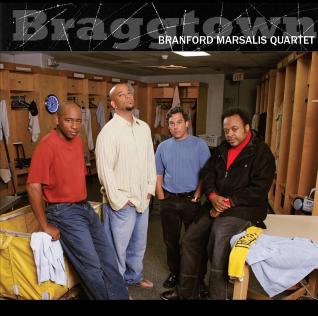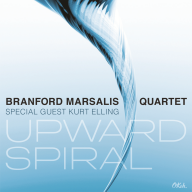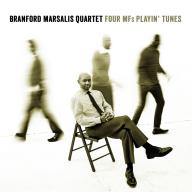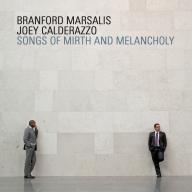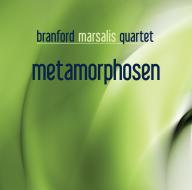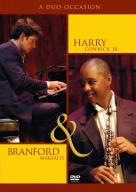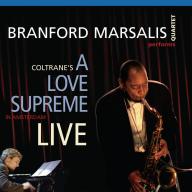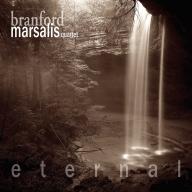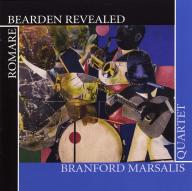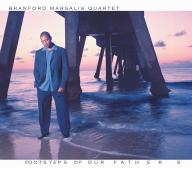Over the course of its life - and most particularly on its previous Marsalis Music scs - the Branford Marsalis Quartet has revealed an ability to express every kind of emotion, including an informed sense of history (on the label-launching Footsteps of Our Fathers in 2002 and the 2004 DVD Coltrane’s ‘A Love Supreme’ Live in Amsterdam), a sensitivity to other artistic disciplines (Romare Bearden Revealed from 2003) and a profound sense of intimacy that stretched the concept of a “ballads album” (2004’s Eternal). The Quartet’s new Braggtown, which Marsalis Music will release on September 12, addresses all of these areas and more. Drawing upon a world of inspirations, including an 17th Century English composer, an Indian Warrior and a Japanese horror film, Braggtown is the Marsalis band’s most comprehensive and compelling recording to date.
“The band’s just getting better,” confirms leader, saxophonist and label head Branford Marsalis. “It comes from the growth of each individual, which you can hear. I know that my tone is more focused on both tenor and soprano saxophones, and my technique is vastly improved. And you can hear the same kind of development in [pianist] Joey [Calderazzo], [bassist Eric] Revis and [drummer Jeff] `Tain’ [Watts].”
“What results is that, when we play together, we are a real group with our own sound. Even if you heard the band only three or four years ago, we sound different – tighter, more explosive. This is the natural way that a band grows when everyone is working at getting better.”
To spotlight this growth, Marsalis selected the strongest new songs from the band’s current repertoire, with an emphasis on burnouts. The Quartet’s desire “to get back to that kind of high-energy music we’ve been doing when we perform” is realized in three powerful tracks featuring the leader’s tenor. The opening “Jack Baker,” with its slashing three-bar melodic form, came out of a conversation between composer Marsalis and Calderazzo. “We were talking about how musicians try to write tunes with ‘a Coltrane sound,’ and my point was that too many simply use scales without the blues licks that Coltrane would have used. It’s easy to just write a scale, but that won’t create a group experience, which is the purpose of writing for a band. So I started writing and ‘Jack Baker’ just came out.”
Other examples of the Quartet in burnout mode are “Blakzilla,” fashioned by Watts and inspired by Akira Ifukube’s music from the classic 1953 Japanese horror film Godzilla, and Revis’ tribute to the legendary chief who fell victim to Westward expansion, “Black Elk Speaks.”
To round out the group portrait, Braggtown also finds the group in moods other than fast and furious, including two originals that feature Marsalis on soprano sax, Calderazzo’s beautiful “Hope” and Marsalis’ “Fate.” “I’d been listening to Wagner, and started singing along with one of his leitmotivs, which led to ‘Fate,’” Marsalis explains. “Later, I learned that the particular motif was always referred to as the ‘fate’ motif.” Marsalis’ listening also led him to “O, Solitude,” an opus by the 17th Century English composer Henry Purcell that he felt would also be an ideal vehicle for his tenor sax and the band. Completing the album is another new Marsalis composition, “Sir Roderick, the Aloof,” originally conceived as a soprano/piano duo before he realized that the iconoclastic theme could also accommodate the power of the full quartet.
As with every disc in the Marsalis Music catalogue, Braggtown is state-of-the-art in terms of both music and sound. “We recorded at the Hayti Heritage Center in Durham, North Carolina, which is where we did Occasion with Harry Connick, Jr. last year,” Marsalis notes. “It is a marvelous room and you can hear the room, which enhances the sound. [Engineer] Rob [Hunter] and I decided to lean more on the room sound and less on reverb, so that the resulting album sounds like less of a production. Then we mixed everything to the drums, which made it all work.”
Marsalis realizes that music so uncompromisingly honest in all of its moods goes against the high-concept, keep-it-simple trend in current jazz recording, but he is unconcerned. “People who listen to the music on its own terms, who are eager listeners, will hear us,” he insists. “This album is for people who truly like music, rather than simply liking to be entertained by music. Too many people use music like they use television, as an entertainment source rather than as an educational tool. Those kinds of people will always have trouble with what we’re doing, because we’re into growth instead of just being into reaffirmation. I’ve had my forays into pop culture, but I left to do this, and I’m willing to accept the consequences.”
This time out, the consequences should find Braggtown acclaimed as one of the era’s most towering musical statements, from one of the era’s most creative ensembles.
